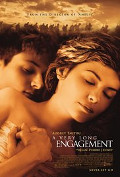
Directed by
Jean-Pierre Jeunet
134 minutes
Rated MA
Reviewed by
Bruce Paterson

Very Long Engagement, A
Synopsis: In WWI-era France, a woman relentlessly searches for the truth about her fiancé, who was believed to have been one of five soldiers court-martialed, then taken to their own front line and left for the enemy.The book on which the film is based, 'Un Long Dimanche De Fiancailles' by Sebastien Japrisot, won France's literary Prix Interallia in 1991 and became a bestseller in France and abroad. Jean-Pierre Jeunet directs from a screenplay co-written with his Amélie collaborator Guillaume Laurant.
Jeunet used to be best known on the art-house circuit for his Cesar award-winning films Delicatessen (1991) and The City of Lost Children (1995) both of which were co-directed with Marc Caro. Their work was marked by whimsy, intricate contraptions, bizarre characters, and even stranger locations. Some of the darkness of their work filtered into Jeunet's later Hollywood outing Alien: Resurrection, and much of the whimsy of Amélie (2001).
Like Amélie. A Very Long Engagement is sure to win ardent admirers. It has a fair helping of whimsy, assisted by a similar style of cinematography, and of course the engaging Audrey Tautou, now playing the more driven character of Mathilde. Tautou's performance is a wonderful interplay of faith over uncertainty, as she overcomes great odds to advance her quest. The film also has a generous measure of morbidity, recreating the darkness of war in a potent argument for peace. The film begins with five soldiers being led to their deaths after being court martialled for shooting themselves in the hand in a vain attempt to get sent home. In truth, hundreds of soldiers died this way in the war. The scenes of war feel strikingly real - the film-makers apparently strived to recreate scenes from war-time photographs.
The light and dark counterparts don't always feel entirely integrated, however, particularly as the film retells a crucial plot point among the trenches at least half a dozen times. This tips the balance in the film towards the unnecessarily grim, as character's stories become voice-overs for bloody battleground scenes. It may have been more successful, and less confusing, to concentrate on the characters themselves, and uncover what effect the war had wrought on them.
Audrey Tautou is not the only familiar face. Jeunet also cast long-time collaborator Dominique Bettenfeld and others you will recognize from Jeunet's previous films, who provide some wonderfully quirky characters. Jodie Foster also makes an appearance, giving a strong presence (in apparently perfect French) to one of the sub-plots. I almost forgot to mention Gaspard Ulliel, who plays Mathilde's lost fiancé. This is partly because he doesn't have much screen-time. It is also partly because he is more of a cypher for innocence lost than a believable character, although the fact that he loses his mind when confronted with the realities of war is perhaps the most believable reaction of any man to that grotesque death-ground.

Want more about this film?


Want something different?




